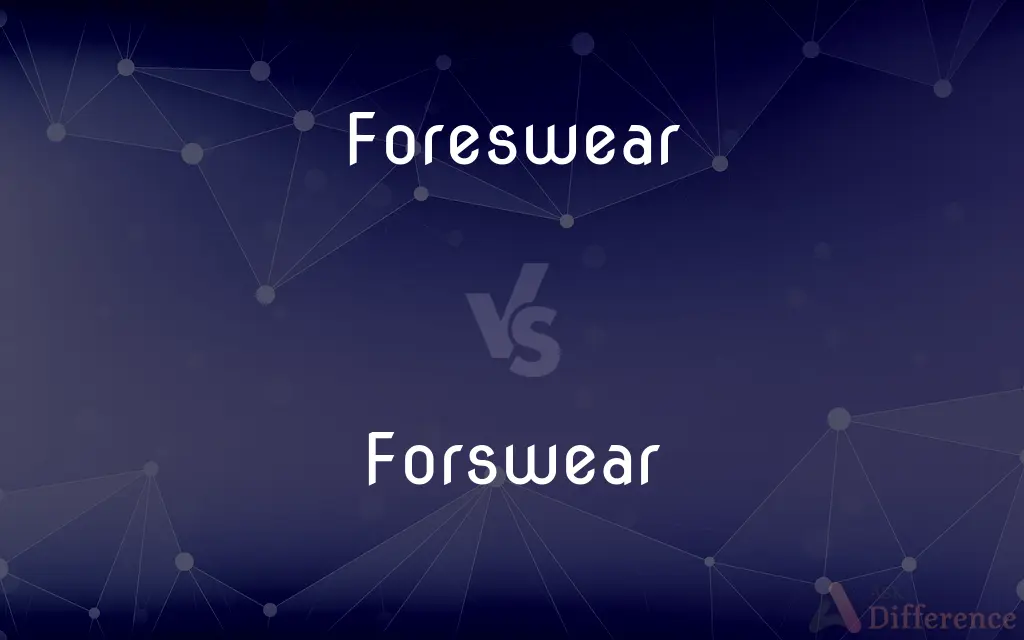Foreswear vs. Forswear — What's the Difference?
By Tayyaba Rehman & Maham Liaqat — Updated on April 1, 2024
Foreswear involves making a solemn promise to abstain from something, while forswear can mean to renounce under oath or swear falsely.

Difference Between Foreswear and Forswear
Table of Contents
ADVERTISEMENT
Key Differences
"Foreswear" and "forswear" are often confused due to their similar spelling and pronunciation, but they have distinct meanings. "Foreswear" primarily involves making a solemn promise to abstain from something or to quit something definitively. It suggests a strong commitment or vow taken, often in a personal or moral context. "Forswear," on the other hand, has a dual meaning: it can mean to renounce something under oath, similar to "foreswear," but it also encompasses the act of swearing falsely or perjuring oneself.
The usage of "foreswear" tends to emphasize a proactive and positive action, such as when one decides to give up a harmful habit or behavior. It carries a connotation of improvement or moral rectitude. Conversely, "forswear" can carry a negative connotation, especially when it refers to the act of swearing falsely, implicating dishonesty or a breach of integrity.
Both terms involve the use of a vow or oath, highlighting their formal or serious nature. However, "foreswear" is often used in contexts where one aims to improve oneself or make a significant life change, while "forswear," especially in its negative sense, is used in legal and ethical discussions regarding truthfulness and oath-taking.
Choosing between "foreswear" and "forswear" depends on the context of the commitment or oath being discussed. If the focus is on personal improvement or abstention, "foreswear" might be more appropriate. If the emphasis is on renunciation or the legal implications of oath-taking, "forswear" could be the better choice.
Comparison Chart
Definition
To make a solemn promise to abstain from something
To renounce under oath or to swear falsely
ADVERTISEMENT
Connotation
Generally positive, implies improvement or rectitude
Can be negative, especially when implying dishonesty
Usage Context
Personal or moral commitments
Legal, ethical, or moral contexts, including dishonesty
Focus
Improvement, abstention
Renunciation, honesty vs. dishonesty
Example
"She foreswore eating sweets for health reasons."
"He forswore any involvement in the scandal, despite evidence to the contrary."
Compare with Definitions
Foreswear
Making a vow to give up something.
He foreswore smoking for his family's well-being.
Forswear
Can imply a breach of ethics.
Forswearing evidence led to the lawyer's disbarment.
Foreswear
Aimed at bettering oneself or one's circumstances.
They foreswore fast food to improve their health.
Forswear
Encompasses both renouncing and lying under oath.
Despite forswearing the act, his guilt was proven.
Foreswear
Involves a serious commitment.
The knight foreswore allegiance to any other ruler.
Forswear
Denying or giving up something formally.
The witness forswore any knowledge of the crime.
Foreswear
Reflects a personal or moral decision.
She foreswore lying to build stronger relationships.
Forswear
Involves dishonesty or perjury.
Accused of forswearing themselves, they faced legal consequences.
Foreswear
Seen as a step towards a positive change.
After much reflection, he foreswore his former habits.
Forswear
Often used in legal or formal contexts.
To forswear any claim to the estate, he signed an affidavit.
Foreswear
Variant of forswear.
Forswear
To decide or declare that one will not or will no longer engage in (an activity or habit, for example)
A political group that has forsworn violence.
Foreswear
Alternative spelling of forswear
Forswear
To decide or declare that one will not or will no longer use or be associated with (something)
"He had cast in his lot with the lions and forsworn the lambs" (Robert Louis Stevenson).
Foreswear
Do without or cease to hold or adhere to;
We are dispensing with formalities
Relinquish the old ideas
Forswear
To disavow under oath
"He was forced to take an oath forswearing heretical views" (Garry Wills).
Foreswear
Turn away from; give up;
I am foreswearing women forever
Forswear
To make (oneself) guilty of perjury.
Forswear
To swear falsely; commit perjury
Forswear
(transitive) To renounce or deny something, especially under oath.
We forswear allegiance and support for the Economic Freedom Fighters.
Forswear
To commit perjury; to break an oath.
Forswear
To reject or renounce upon oath; hence, to renounce earnestly, determinedly, or with protestations.
I . . . do forswear her.
Forswear
To deny upon oath.
Like innocence, and as serenely boldAs truth, how loudly he forswears thy gold!
Forswear
To swear falsely; to commit perjury.
Forswear
Formally reject or disavow a formerly held belief, usually under pressure;
He retracted his earlier statements about his religion
She abjured her beliefs
Common Curiosities
Can "forswear" ever have a positive connotation?
"Forswear" can have a positive connotation when it refers to the renunciation of harmful or undesirable actions or goods, similar to "foreswear."
How can I remember the difference between "foreswear" and "forswear"?
Think of "foreswear" as "fore" (before) swearing off something as a vow for improvement, and "forswear" as renouncing or denying something, sometimes falsely.
Is "foreswear" just an old-fashioned way of saying "forswear"?
While they sound similar and both have historical roots, they retain distinct meanings regarding solemn promises and renunciation or dishonesty.
How are these terms used in legal contexts?
"Forswear" is more common in legal contexts, especially when discussing the truthfulness of testimony or the renunciation of rights under oath.
Are these words interchangeable in poetry or literature?
In poetry or literature, they might be used more flexibly for stylistic purposes, but their core distinctions regarding oath-taking and renunciation still apply.
How does culture affect the interpretation of these terms?
Cultural context can influence the weight and seriousness attributed to oath-taking and renunciation, impacting how these terms are understood and used.
Can organizations or groups forswear or foreswear practices?
Yes, organizations can make commitments to abstain from certain practices (foreswear) or formally renounce previous actions or policies (forswear).
Can someone forswear something accidentally?
"Forswear" implies a conscious decision, so accidental renunciation would not typically use this term, especially in its context of swearing falsely.
How does the perception of these actions affect relationships?
The perception can significantly affect relationships, with foreswearing often seen as a positive commitment, while forswearing falsely could lead to trust issues.
Can the action of forswearing be reversed?
While one can technically reverse a renunciation (forswearing), it may have legal or social repercussions, depending on the context.
Is there a modern relevance to these terms?
Both terms are relevant in discussions about personal ethics, commitments, and legal testimony, though they may sound formal or archaic.
What is the impact of forswearing falsely?
Forswearing falsely, especially in legal contexts, can lead to serious consequences, including charges of perjury.
What role does intent play in distinguishing between foreswear and forswear?
Intent is crucial; foreswearing involves a deliberate vow to improve or abstain, while forswearing involves a conscious choice to renounce or deceive.
Are these terms used in specific religious or cultural rites?
Yes, both terms can be used in the context of religious or cultural rites involving vows, commitments, or renunciation.
Share Your Discovery

Previous Comparison
Parry vs. Counter
Next Comparison
Somersault vs. SomersetAuthor Spotlight
Written by
Tayyaba RehmanTayyaba Rehman is a distinguished writer, currently serving as a primary contributor to askdifference.com. As a researcher in semantics and etymology, Tayyaba's passion for the complexity of languages and their distinctions has found a perfect home on the platform. Tayyaba delves into the intricacies of language, distinguishing between commonly confused words and phrases, thereby providing clarity for readers worldwide.
Co-written by
Maham Liaqat













































